Introduction
Without a doubt, power of blockchain technology has been making waves in recent years. Obviously, this technology revolutionizing the way we think about security, trust, and transparency in the digital world. All of that, because its decentralized structure. So … blockchain has the potential to transform a wide range of industries.
Starting from finance and healthcare to supply chain management and beyond. So, I’ve had the opportunity to explore the amazing possibilities of blockchain and how it can unleash the power of a decentralized world. Indeed, in this article, I’ll explore the basics of blockchain technology. Then its benefits and potential drawbacks.
Next, I will write how it’s already being used to create innovative solutions. Consequently, they are changing the way we live and work.
Whether you’re a blockchain enthusiast or just curious about this fascinating technology, but you still locking for the asnwers. Undoubtedly, this article will give you a glimpse into the exciting possibilities of a decentralized future.
How Does Blockchain Work?
Before we explore the potential of blockchain, it’s important to understand how it works. At its core, a blockchain is a decentralized digital ledger, indeed. Moreover, all transactions are recored in a secure and transparent manner.
Unlike traditional centralized systems that rely on a single point of control. So to say, a blockchain network is maintained by a decentralized network of nodes, each of which holds a copy of the ledger.
When a new transaction is made, it is broadcast to the network of nodes. Then verify the transaction and add it to the ledger. Especially, each block in the chain contains a cryptographic hash of the previous block. All of them together creating a secure and tamper-proof record of all transactions, indeed.
This means that once a transaction is recorded on the blockchain, it cannot be altered or deleted. So, that providing a high level of security and transparency. That’s real power of blockchain. Isn’t it ?
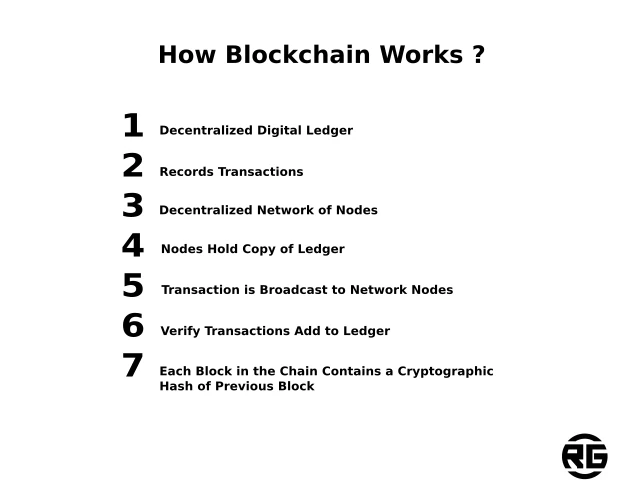
Blockchain technology can be simplified to transparent public ledger with fully recorded transactions, indeed.
Is Blockchain Disruptive Innovation?
Blockchain is a disruptive innovation due to its unique characteristics and the transformative impact it can have on various industries.
Here are some key following reasons why blockchain is disruptive.
Decentralization
Firstly, blockchain operates on a decentralized network of computers. So they are referred to as nodes, which collectively maintain and validate the blockchain’s data.
This eliminates the need for a central authority or intermediary, such as a bank or government, to facilitate transactions or verify information. Consequently, by removing intermediaries, blockchain enables peer-to-peer transactions, reduces costs, and increases efficiency.
Trust and Transparency
Secondly, blockchain technology utilizes cryptography and consensus mechanisms to ensure the integrity and transparency of data. All that means that, transactions recorded on a blockchain are immutable. Simplier said so, it meaning they cannot be altered or tampered with.
Without a doubt, this feature provides a high level of trust and transparency. It’s so making blockchain suitable for applications like supply chain management, where transparency and traceability are crucial.
Security
Thirdly, blockchain incorporates advanced cryptographic techniques to secure transactions and data. The decentralized nature of blockchain makes it inherently more secure than traditional centralized systems. As well as that, there is no single point of failure that can be targeted by malicious actors.
Additionally, the use of consensus algorithms, such as Proof of Work or Proof of Stake, adds an extra layer of security by requiring network participants to validate and agree upon transactions.
Disintermediation and Cost Reduction
Obviously, by eliminating intermediaries, blockchain has the potential to disrupt industries. Especially, all industries that heavily rely on intermediaries for trust, verification, and transaction facilitation.
For example, in the financial sector, blockchain-based cryptocurrencies enable direct peer-to-peer transactions without the need for banks or payment processors.
Furthermore, this reduces costs associated with traditional financial services and allows for faster and more efficient transactions.
Tokenization and Asset Ownership
Last but not least, blockchain enables the tokenization of assets, representing ownership rights or real-world assets on a blockchain. So this opens up new possibilities for fractional ownership, liquidity, and efficient transfer of assets.
For example, blockchain-based platforms facilitate the trading of digital assets. Such as digital art or real estate, allowing for broader access to investment opportunities and new economic models.
Smart Contracts
Finally, smart contracts are self-executing contracts with predefined rules and conditions embedded within the blockchain. As well as, they automatically enforce the terms of an agreement without the need for intermediaries. Smart contracts have the potential to revolutionize various industries, without a doubt.
Such as supply chain management, insurance, and legal systems, by automating processes, reducing costs, and minimizing the risk of fraud.
These disruptive aspects of blockchain technology have the potential to reshape industries. Redefine business models, and empower individuals by offering greater control, transparency, security, and efficiency.
However, it is important to note that blockchain is still an evolving technology.
Indeed, its widespread adoption and implementation face technical, regulatory, and scalability challenges. That need to be addressed for its full potential to be realized. So to say, power of blockchain isn’t comming from nowhere.
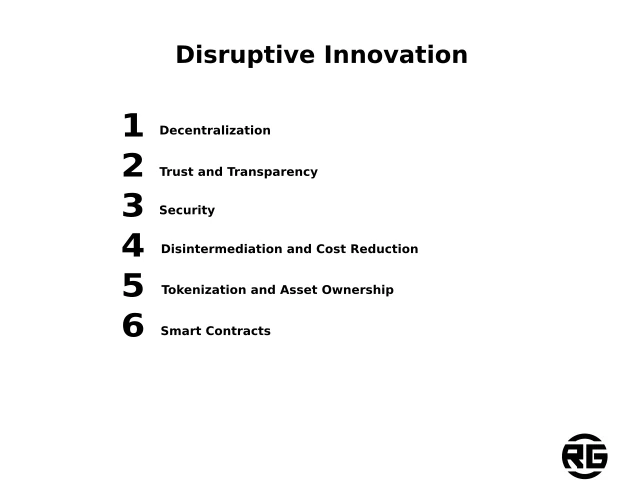
Obviously, after reading those few points you should be convinced about blockchain as disruptive innovation.
Benefits of Blockchain Technology
One of the key benefits of blockchain technology is its ability to provide a high level of security and transparency. Because each block in the chain is linked to the previous block, it creates a tamper-proof record of all transactions.
This makes it nearly impossible for anyone to manipulate the ledger or commit fraud.
In addition to security and transparency, blockchain technology also offers a high level of efficiency. Because the ledger is maintained by a decentralized network of nodes, there is no need for a central authority to verify and record transactions.
This can significantly reduce the time and cost associated with traditional systems.
Finally, power of blockchain technology has the potential to enable new forms of collaboration and innovation.
By providing a secure and transparent platform for transactions, blockchain can facilitate the development of new products and services that were previously impossible or impractical.
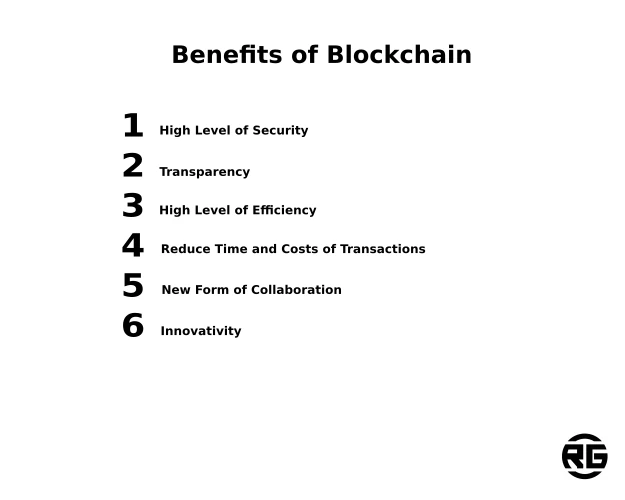
Are you surpise that blockchain brings to the table so many benefits ?
Potential Applications of Blockchain Technology
At the beginning, blockchain technology has the potential to transform a wide range of industries. Starting from finance and healthcare to supply chain management and beyond, so to say. Here are just a few following examples of how blockchain is already being used to create innovative solutions:
Decentralized Finance (DeFi) and Blockchain
Decentralized finance, or DeFi, is a new paradigm that is emerging in the financial sector. DeFi refers to a system of financial applications and services that are built on top of a blockchain network, such as Ethereum.
Moreover, these applications are designed to provide financial services in a decentralized, secure, and transparent manner.
Besides, one of the most popular DeFi applications is decentralized exchanges (DEXs). Particularly, applications like Uniswap allow users to trade cryptocurrencies without the need for a centralized exchange.
Especially, other DeFi applications include lending and borrowing platforms, insurance, and prediction markets.
Blockchain in Supply Chain Management
Blockchain technology has the potential to revolutionize the way we manage supply chains. By providing a secure and transparent platform for tracking goods and services. Blockchain can help reduce fraud, increase efficiency, and improve transparency.
For example, Walmart is using blockchain technology to track the supply chain of its fresh produce.
By scanning a QR code on a package of lettuce, customers can see the entire journey of the lettuce. From the farm to the store. This provides a high level of transparency and helps ensure the safety and quality of the produce.
Blockchain in Healthcare
Blockchain technology can also be used to improve healthcare by providing a secure and transparent platform for storing and sharing medical records.
By using a blockchain-based system, patients can have greater control over their medical records and can share them with healthcare providers in a secure and efficient manner.
One example of a blockchain-based healthcare platform is MedRec, which is being developed by researchers at MIT. MedRec uses blockchain technology to provide a secure and transparent platform for storing and sharing medical records.
Blockchain in Voting Systems
Blockchain technology can also be used to improve the security and transparency of voting systems. By using a blockchain-based system, it is possible to create a tamper-proof record of all votes. It ensuring that the results of an election are accurate and transparent.
One example of a blockchain-based voting system is Follow My Vote. It’s designed to provide a secure and transparent voting platform. Follow My Vote uses blockchain technology to ensure that all votes are recorded and counted accurately. All of that, providing a high level of security and transparency.
You can see more and more examples power of blockchain in many industries.
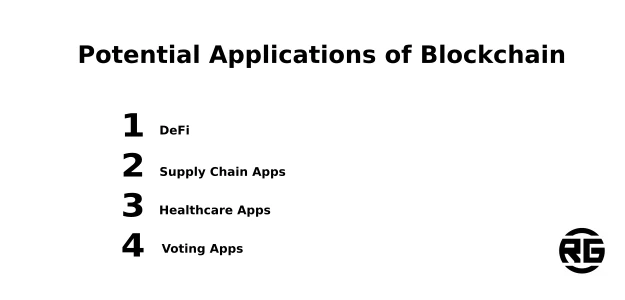
Indeed, you can find already where blockchain is already used – DeFi, supply chain management, healthcare and voting systems.
Limitations of Blockchain Technology
While blockchain technology offers many benefits, it also has some potential drawbacks and limitations.
Firstly, one of the biggest challenges is scalability, as blockchain networks can become slow and inefficient as the number of transactions increases.
Another challenge is the potential for regulatory issues, as blockchain networks may not comply with existing laws and regulations. Additionally, there is the potential for security vulnerabilities, as blockchain networks may be vulnerable to attacks.
Finally, there is the challenge of adoption, as many traditional industries may be resistant to change and may be slow to adopt blockchain technology.
All technologies, even those the best are limited to some level. Power of blockchain isn’t full shine yet. But future seems to belong to blockchain technology.
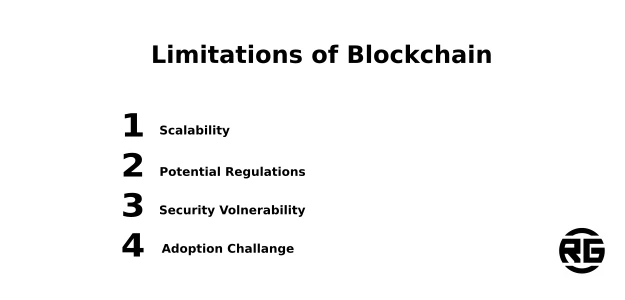
All technologies have limitations and in case blockchain they happen, as well.
Future of Blockchain Technology
Despite these challenges, the future of blockchain technology looks bright.Without a doubt, power of blockchain wasn’t fully discovered yet. As well as, more industries begin to explore the potential of blockchain, we can expect to see new and innovative solutions emerge.
In the financial sector, we can expect to see the continued growth of DeFi applications, as well as the development of new blockchain-based payment systems. In the healthcare sector, we can expect to see the continued development of blockchain-based medical record systems, as well as the use of blockchain to improve clinical trials.
Finally, we can expect to see the continued growth of blockchain-based supply chain management systems, as well as the adoption of blockchain in voting systems and other areas.
Conclusion
Obviously, blockchain technology is a powerful tool that has the potential to transform a wide range of industries.
The power of blockchain is great, so great that it is difficult to ignore it. Simpler that to say so, its decentralized structure, blockchain offers a high level of security, transparency, and efficiency. In addition, it’s providing a platform for new forms of collaboration and innovation.
While there are challenges and limitations to blockchain technology, the future looks bright for this exciting and innovative technology. Whether you’re a blockchain enthusiast or just curious about this fascinating technology, the possibilities of a decentralized future are truly amazing.

Leave a Reply
You must be logged in to post a comment.